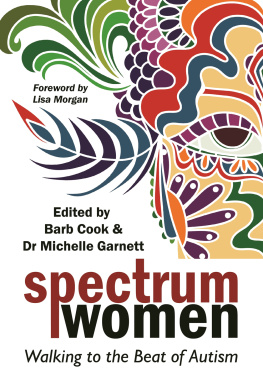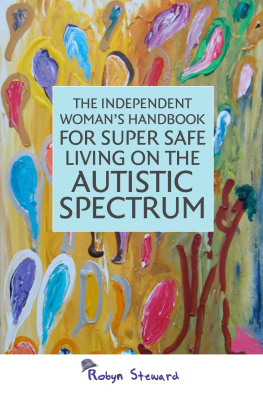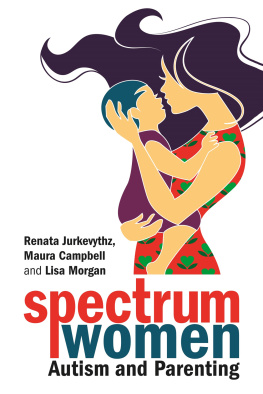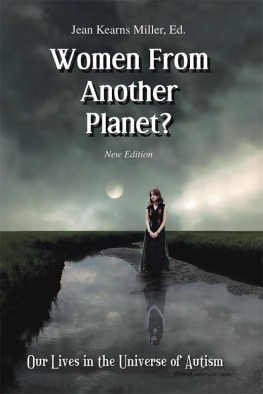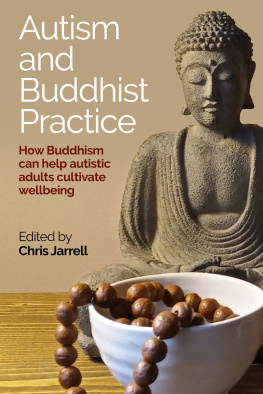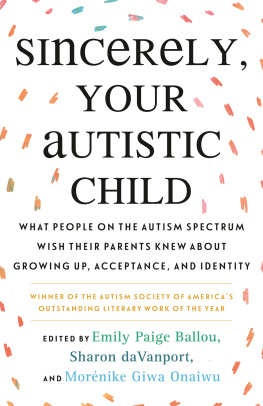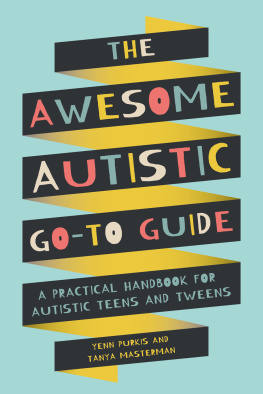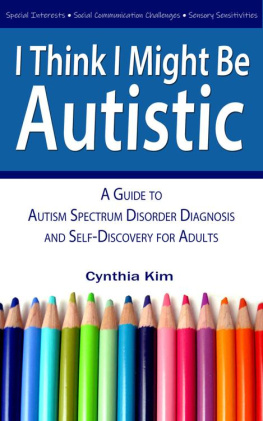
spectrum women
Walking to the Beat of Autism
Edited by Barb Cook and Dr. Michelle Garnett
Foreword by Lisa Morgan
The Spectrum Women Mentors:
ARtemisia, Maura Campbell, Samantha Craft, Jen Elcheson, Dena Gassner, Liane Holliday Willey, Christine Jenkins, Renata Jurkvythz, Anita Lesko, Becca Lory, Terri Mayne, Jeanette Purkis, Kate Ross, Catriona Stewart

Jessica Kingsley Publishers
London and Philadelphia
Contents
Foreword
Stop! Are you ready to know what it feels like to be an autistic woman? To be immersed in the lives of these women on the spectrum who have shared their personal experiences so vividly it will be as if you are walking in their shoes?
Hello, Reader. In your hands you are holding pages and pages of lived experience, wisdom, and support written by autistic women, to be able to learn from at any time you need help, or when you just want to feel as if you belong. This book can be used as a map to unravel the confusion and soften the hurt that living life as an autistic woman can bring in so many different ways.
Have you ever wanted a direct line to experienced autistic women to ask the hard questions and get help navigating the endless confusion of life on the spectrum? Women you could have access to at any time of the day or night, to help you figure things out? They are within the pages of this book.
Do you want to know how it feels to be understood and to know that someone out there has had the same experiences you have had in life? To finally celebrate your life on the spectrum with others who know how sweet successes can be when they are strived for while in the trenches of a life that doesnt make much sense most of the time?
Maybe there was a conversation you thought went well, only to find out the person you were speaking with is so angry they wont talk to you anymore. Perhaps an unfair situation at work is too difficult to figure out on your own and you need some guidance on how to proceed. Sometimes the isolation and loneliness of being misunderstood feels impenetrable. All of these topics and more are covered in the book by women who have been there and lived those experiences out and learned valuable truths they are now passing on to you.
I, too, am an autistic woman, diagnosed later in life, with plenty of my own lived experiences to share, yet I finally understood more about who I really am within the pages of this book. I remember being left out of activities in school, feeling alone and misunderstood at work, and just not belonging to this world. As I read the book, I started feeling as if I belonged. I felt what its like to be on the inside for once, for knowing what they were talking about, the language they were using, and the world they described.
I felt like I was part of the vibrant, intelligent, creative, empathetic, proactive, wise, and thoughtful group of women who have much to give to any reader who wants to know more about what life as an autistic woman is all about. It was so comforting.
Yes, the people who wrote this book are autistic women, heroines in their own right as they have shared their personal lives for the sake of other women on the spectrum. They are your cheerleaders as you navigate life on the spectrum. Can you hear them? Oh, they are probably using the silent clap knowing all too well that real clapping hurts the ears.
Lisa Morgan, MEd
Author of Living through Suicide Loss with an Autistic
Spectrum Disorder (ASD): An Insider Guide for Individuals,
Family, Friends, and Professional Responders
Preface
Autistic Pride. This is where it all started one fateful evening in June, last year. I (Barb Cook) could be precise on date and time, but will let it slide this time, just to coerce you a little into reading some more. I mean, prefaces arent usually the most exciting part of the book, but how this book evolved most certainly was for us. Usthe women of this book.
The book had its humble beginnings rooted in a conversation by the writers team of Spectrum Women Magazine . Autistic Pride Day was fast approaching and it was suggested by Jeanette (Purkis)with prompting from Mr. Kittys tapping pawthat we should write a collaboration of stories on what Autistic Pride meant to us.
It was halfway through this idea-flinging chat that, for some reason, the idea popped into my head that we should all write a book together. Hell, we do have a lot to offer, and we are all on the autism spectrum, plus we have experienceyears and decades of experiencesitting within us that needed to be shared.
You know, it did give me a thought, Renata (Jurkvythz), that we should all write a book together, maybe called Spectrum Women , each giving our personal insights. Like a book that is empowerment and mentoring to fellow autistic women? Those, my exact words, midway through our discussion, had set the wheels in motionon a train, down a hill, without any brakes
Within hours a proposal was whisked away to Jessica of Jessica Kingsley Publishersyou might have noticed the imprint on the book (bit of a giveaway)about how much the women and identifying women of the autism spectrum needed a candid, honest, and open-hearted book written by those who get them, live a life like them, and want to share with them that they dont need to navigate this life feeling alone.
We expanded the fold to include autistic women who were not just exclusive to the Spectrum Women Magazine writers team. The number of ideas was immense and topics became tailored into chapters to cover what we felt were an essential start to this mission. Now, keeping you on that word missionreminiscent of a Bond movieM (Maura Campbell) became my left-hand (Im left-handed) side-kick, the woman behind the woman, my sanity, my sounding board, my second pair of eyes, my friend with a sense of humor so dark that you needed a torch, the person who helped me make it all the way to the end. Without M, I dont think I could have pulled this all together as brilliantly as we did. (This was not a paid advertisement.)
There are a lot of considerations to be taken into account when pulling a book like this together, and I am sure there will be parts that some of you may not agree with, and that is fine. We all have our insights and personal views which make us different; we embrace that. Keeping this in mind, we tried to encompass a wide diversity of thought, terminology, and writing styles used, while embracing our own personal choices.
As this book caters for a global audience while being mindful of how identification can impact both the individual and the community who views them, we have decided on encompassing some of the following terminology:
Identity-first language. Identity-first language has been mostly used as this is the preferred method for people identifying as being on the autism spectrum.
General identification. Person/woman/girl/those on the spectrum. With autism has been used in context academically and historically.
Autism spectrum disorder (ASD). ASD has been used instead of autism spectrum condition (ASC) for academic purposes. This is not a reflection of our personal choice in identification.
Asperger syndrome, Aspergers, and the personal identifying term of aspie. We recognize that Asperger syndrome was removed from the current Diagnostic and Statistical Manual of Mental Disorders (DSM-5) and was brought together under the Autism Spectrum Disorder classification. At time of printing of this book, the International Classification of Diseases (ICD-10) still formally recognizes Asperger syndrome as a diagnosis. We have included these terms to encompass those who were/are diagnosed with Asperger syndrome and in a historical sense for academia.
Next page
